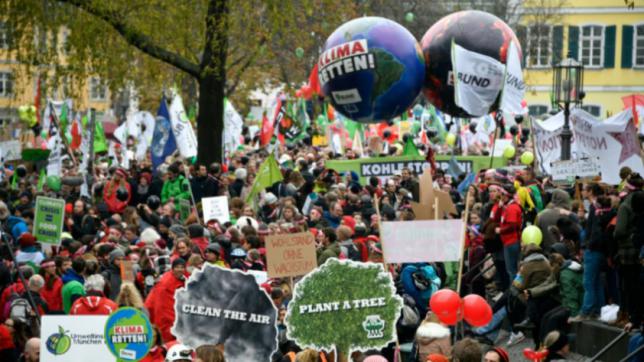Bonn, 7 Nov (Jade Chiang and Meena Raman) – Developing countries raised several key

concerns at the opening of the 47th session of the Subsidiary Body for Implementation (SBI 47) on 6 Nov., which was held after the official opening of the 23rd Conference of the Parties (COP 23) to the UNFCCC in Bonn.Presiding over the meeting, Chair Tomasz Chruszczow (Poland), reminded Parties to work diligently to deliver draft conclusions and decisions in time for adoption at the SBI two-part closing plenary scheduled for the afternoon of 14 Nov. and morning of 15 Nov.
The adoption of the agenda items was smooth except for item 5 on ‘Common time frames for nationally determined contributions (NDCS) referred to in Article 4, paragraph 10, of the Paris Agreement (PA)’.
In determining the action to be taken on this agenda item, Chruszczow stated that the SBI would initiate consideration of this item and informal consultations will be held with a view to adopting a draft conclusion that would be submitted to COP 24 next year.
Work on several agenda items began right after the adoption of the agenda.
Another matter which arose in relation to NDCs was that of the public registry for NDCs and the public registry for adaptation (items 6 and 7 of the SBI agenda). Several developing countries wanted the discussions to be held together, as the matters were related. The SBI Co-Chair assured Parties that the discussions on these two items will be held one after another.
Several developing countries also highlighted the importance of making progress on the issue of the Warsaw International Mechanism on Loss and Damage (WIM). This included Sudan for the African Group, Maldives for the Alliance of Small Island States (AOSIS) as well as Bahamas and Cuba. This discussion took place when work related to the ‘Report of the Executive Committee of the WIM for Loss and Damage associated with Climate Change Impacts’ under agenda item 13 was being launched.
Common time frames for NDCs
China speaking for the Like-minded Developing Countries (LMDC) raised two concerns. Based on its understanding of Article 4 (10) of the PA, it said the common time frame of NDCs will be considered by the SBI but there was no mandate to produce a decision to be adopted by the COP serving as the first meeting of the Parties to the Paris Agreement (CMA1). It cautioned that this would prejudge the outcome of the negotiations and be tantamount to a reinterpretation of the PA.
Article 4 (10) of the PA provides that the CMA “shall consider common time frames for NDCs at its first session.”
(Common time frames for NDCs relate to the length of the period of a contribution, as currently, Parties have communicated either a 5- or 10-year time frame from 2020 that expires in 2025 or 2030. Brazil has been advocating for a common time frame for all Parties.)
The LMDC also questioned the appointment of the two co-facilitators for the planned informal consultations during this session. It was of the view that the appointment of co-facilitators should have been based on consultations with regional groups to reflect the views and concerns of all the groups.
Chruszczow replied that he was following “the understanding of the Marrakech COP 22 that the entire package of the implementation of the PA should be finalised at COP 24 (in 2018). It’s kind of a reflection of the conclusion from Marrakech that common time frame will constitute part of the implementation package”.
On the appointment of the co-facilitators (from Norway and Kenya), he explained that it is the Chair’s prerogative and responsibility to choose those from among the delegates to assist him under his responsibility in facilitating this important negotiation.
To this, China said the Group’s understanding of the Marrakech outcome was an oral decision that the issue will be discussed at the current Bonn session and that it is part of the ‘orphan issues’ of agenda item 8 of the Ad Hoc Working Group on the Paris Agreement (APA).
(The ‘orphan issues’ China was referring to relate to issues that have yet to be assigned under any of the subsidiary or thematic bodies of the Convention to undertake further work in relation to the Paris implementation work.)
China expressed that it did not want the SBI Chair to prejudge whether there would be a decision on the matter at the CMA in 2018. “We want to have substantive discussions on whether this issue would have an outcome at CMA1.3 (in 2018). We think your personal understanding should be subjected to the specific wordings of Article 4 (10) of the PA,” it added.
It urged Chruszczow to withdraw his remarks on the need to adopt such a decision at COP 24 to avoid the prejudging of the outcome.
To show maximum flexibility, the LMDC spokesperson said, the group can agree with the two co-facilitators. However, it expressed the need for better communication in the determination of co-facilitators for such important issues.
In supporting China, India noted that the matter is a very important issue, emphasising openness and a Party-driven process.
Brazil said consideration of the issue means to open the consultation to a Contact Group and the mandate is for the co-facilitators to report back in the form of a draft conclusion. It said it would be difficult for other delegations if the understanding is that there would be no decisions.
“There has to be a decision on this matter even if there is (going to be) no common time frame,” Brazil stressed.
Chruszczow said the exchanges illustrate that the discussion started in Marrakech has not yet matured and he does not want to engage in a discussion on the meaning of words. He then conceded to the following amendments – SBI initiate consideration at this session and Parties are invited to make swift progress on this matter with the view to reporting back to CMA1.
Public Registry for NDCs
On the agenda items on development of modalities and procedures for the operation and use of a public registry referred to in Article 4(12), of the PA and the development of modalities and procedures for the operation and use of a public registry referred to in Article 7(12), of the Paris Agreement, China for LMDC proposed joint informal consultations to be co-facilitated by the same persons given that the two items are closely related in many aspects.
Saudi Arabia endorsed the LMDC proposal for a joint session.
Chruszczow noted that the two items have many overlapping issues and they should be treated as closely as possible. He said the work of these two items can be organised by having the same co-facilitators and having them back-to-back.
China for LMDC said based on past experiences, the back-to-back arrangement is hampered by logistical problems with clashes of these two items with items 3 and 4 of the APA and the group would like to see support from the Secretariat on the scheduling of meetings.
Loss and Damage
COP 19 and 20 requested the Executive Committee (Excom) of the WIM for Loss and Damage to report annually to the COP through the subsidiary bodies and to make recommendations, as appropriate.
Parties at COP 22 approved the indicative framework for the five-year rolling workplan of the ExCom as the basis for developing corresponding activities. Two regular meetings of the ExCom took place in 2017 and a report has been presented to the SBI and the Subsidiary Body for Scientific and Technological Advice (SBTA). Parties are invited to consider the report and recommend draft conclusions or a draft decision resulting from the implementation of its workplan for consideration and adoption at COP 23.
The Bahamas was the first to intervene on the matter, stressing that there was need to look at the WIM as a whole as to whether progress was being made following the decision taken in Warsaw in 2013. It noted the ExCom report which indicated budgetary constraints and said this needed to be addressed when discussion on the UNFCCC Budget is had. It also said that the ExCom is not the Mechanism there is need to create the Mechanism.
Cuba supported the Bahamas and added that it had doubts whether there had been progress on the implementation of the WIM. It said that given the lack of effective mitigation action, climate change impacts were being felt with destruction in many developing countries, adding that an effective Mechanism was needed. The ExCom is a tool for action and financial resources are needed for the WIM to be effective in helping developing countries impacted by climate change.
The AOSIS said that the ExCom meets twice a year while the opportunity to address matters related to loss and damage only occurred once a year at the COPs. It stressed the need for loss and damage issues to be brought up inter-sessionally during the meeting of the Subsidiary Bodies and this decision is needed at COP 23 to address the problem.
Sudan for the African Group commented that the ExCom report was rich and hoped that the WIM could deliver on all its functions. The most important function it said was action on support to enable financial resources for measures to be taken on the ground. It said that since the WIM was decided in Poland, perhaps on its fifth anniversary next year again in Poland, the Mechanism will be able to serve developing countries address climate change.
Further discussions on the matter will be conducted under the SBI agenda at the current session to advance further work. – Third World Network




